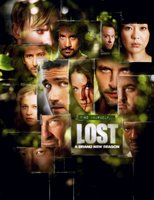 About six weeks ago, upon the recommendation of several people I know, I rented Season 1 Disc 1 of Lost, a TV show about a bunch of castaways on a really creepy island. First, I gotta say that I love this show. It's definitely one of the best shows I've ever watched. Even Robin, my wife, is totally into this show--and she usually can't stand scary sci-fi stuff.
About six weeks ago, upon the recommendation of several people I know, I rented Season 1 Disc 1 of Lost, a TV show about a bunch of castaways on a really creepy island. First, I gotta say that I love this show. It's definitely one of the best shows I've ever watched. Even Robin, my wife, is totally into this show--and she usually can't stand scary sci-fi stuff.I do have to admit, however, that some of the stuff they do to keep the dramatic tension high is getting a little predictable. Here, for instance, are the six rules of interpersonal dynamics on Lost:
1) Always keep secrets. If you discover something new about the island, make sure nobody finds out.
2) If they do find out, lie about it.
3) Always blame someone before you have any evidence.
4) After blaming that person, hit them.
5) If you're going on an expedition, tell everyone else they can't come.
6) If you've been told not to go on an expedition, secretly follow them.
There are probably some more rules I've overlooked. If you've got any I'd love to hear them!
All that said, I think the spiritual aspect of the show is pretty interesting. It's also pretty indicative of the culture we live in today.
There's a clear tension between reason and faith on Lost, especially in season one and the beginning of season two. The two characters that embody those worldviews are Jack (reason) and Locke (faith). Jack needs empirical evidence for everything and is skeptical of anything that isn't confirmed by logic. Locke is convinced that they are on the island for a reason and is willing to risk everything to blindly follow that belief.
So you've got the tension between the modern worldview and the postmodern worldview. Interestingly, age is not a factor in this. It's the young guy (Jack) who embodies the modern perspective and the old guy (Locke) who embodies the postmodern perspective.
I'm about halfway through season two, and the show has added a whole new layer of spirituality by adding a new character, Mr. Eko--who happens to be a Nigerian warlord-turned-Catholic priest!
In the last episode I watched tonight, titled "Fire + Water," Mr. Eko actually baptizes two characters on the show: Claire and her baby. Something like that would have been unheard of even ten years ago on prime time TV!
Granted, the theology is usually pretty bad. Mr. Eko told Claire that when John the Baptist baptized Jesus he saw the Holy Spirit come down on Jesus, signifying that the baptism had washed away all of his sins. That's not, of course, how we understand the baptism of Jesus. Nor do we believe that baptism is what removes our sins. Baptism is merely a sign and a seal of that which removes our sins--namely the and resurrection of Jesus.
But, y'know... I'm not gonna hold it against them. The writers of Lost aren't trying to be theologians. They're trying to be spiritual. And that's a great start!
There are a lot of people who are in that same place on their life journey. They've got bad theology, but they want to be close to God.
Are we gonna blast them for their bad theology? Or are we gonna encourage them to keep their eyes open? To keep searching? To keep reaching for God?
And as we are given opportunities, will we then point them to the true God, the God who says, "You will seek me and find me when you seek me with all your heart"?

No comments:
Post a Comment